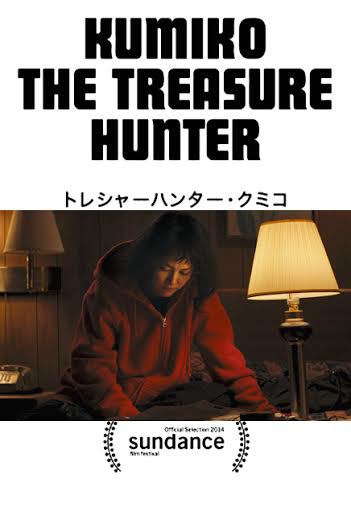« Starz Denver Film Festival 2014 - The Patent Wars | Main | Touch of the Light »
November 22, 2014
Starz Denver Film Festival 2014 - Kumiko, the Treasure Hunter

David Zellner - 2014
Amplify
Though Alexander Payne's relation to this film was as Executive Producer, Kumiko might be seen as something of a companion piece to his own Nebraska. Both are road trip films with people certain of the prize at the end of their destination, no matter how unrealistic it may seem, no matter what doubts others express, no matter what obstacles seem to get in the way. As humorous as the premise may seem, about a Japanese woman convinced of the reality of a scene of buried money in the Coen Brothers' Fargo, this is not played for laughs, although there are some moments of humor.
Rinko Kukuchi's Kumiko is an aging "office lady" in Tokyo. By aging, she is twenty-nine and single when most women in that position have left by twenty-five and are married. The lowest in the pecking order, Kumiko is the one to get tea for the boss and go on errands on his behalf. You can tell by looking at her face, and disheveled appearance, that life has beaten her up. Kumiko would rather be alone in her cramped apartment with her pet rabbit, Bunzo, than be out in the world.
The discovery of a worn VHS tape of Fargo with its announcement at the beginning that the film is a true story are all Kumiko needs to inspire her quest which brings her to snowy Minnesota, with her collection of maps. When Kumiko arrives in Minneapolis, the 1965 song, "Dream", by Pete Drake is on the soundtrack. The song itself, with Drake's "talking" steel guitar, sounds like something from another world, metallic and distorted. But there are parts of the movie that suggested to me that Kumiko's life was weaving in and out of dreams, without any kinds of the usual visual cues that announce themselves, but with certain details that seem out of place.
When Kumiko's boss has, what is in his mind, a friendly discussion about Kumiko's career, the options presented are the most traditional choices. Kumiko responds about making her own path. In a way that's as indirect as Kumiko's path, the film is about both dreams and tenacity. Where it lends itself also to being understood as some kind of fairy tale is in Kumiko's identifiable red hooded jacket. There is no big, bad wolf, although there is one possibly wild dog.
Where there is humor, it is often found in static camera shots, with Kikuchi's actions within the frame, simply observing her, and letting the action speak for itself. The observational humor also extends to some cultural misunderstandings with a couple of Minnesotans trying to help Kumiko. And as wry as these moments are, it gives way to a smile at a satisfying ending.
Posted by Peter Nellhaus at November 22, 2014 06:48 AM
